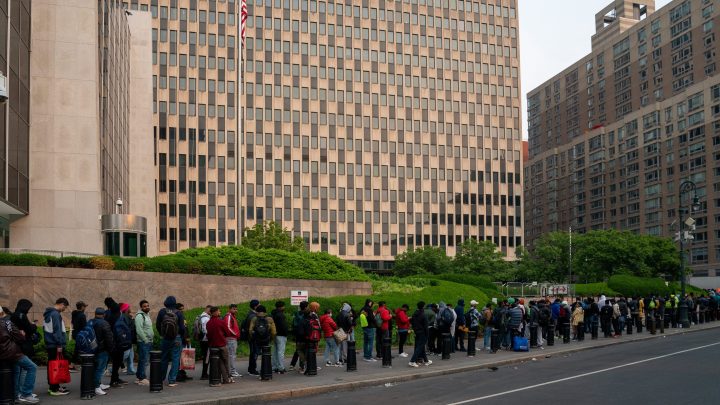
Could migrants be the answer to New York’s restaurant labor shortage?
Could migrants be the answer to New York’s restaurant labor shortage?

This story was produced by our colleagues at the BBC.
Colombia native Alexandra Gomez Castro was overjoyed at finally being allowed to get a job in the United States. Her heart jumped, she said, when she received a permit to work legally in New York City.
“When I received the work permit, I became filled with tears. A great emotion,” she said happily.
Castro, her husband and their three children are part of a large influx of migrants arriving in New York City, totaling more than 180,000 since 2022, according to city officials. They come from all over the world. Many are from South and Central America, fleeing threats of violence by foot and seeking asylum at the U.S. border.
“We arrived with nothing because they took absolutely everything away during the journey.”
The family traveled north to New York City, which uniquely provides shelter to anyone without housing. A nonprofit, Project Rousseau, handled her asylum application and secured her work permit
Not everyone finds their way through the complex forms and bureaucracy, however. They wait in old hotels and schools, now makeshift shelters teeming with new arrivals. City services are under immense strain. There are calls to send the migrants back and close the border.
Yet business owners in the city say these new arrivals could be the answer to their labor shortages. Hospitality businesses in New York City, in particular, say they want working visas for migrants to be fast-tracked as they struggle to fill job vacancies.
Barbara Sibley owns the La Palapa restaurants in New York City. She told the BBC she’s on a WhatsApp group with around 300 restaurateurs.
“Everyone is asking all the time: ‘Do you have a line cook?’ ‘Do you know of a manager?’ ‘Do you have a waiter?’” she said.
She said migrants come by her restaurant in Manhattan’s East Village looking for work. But their path to legal work is slow and complicated.
“The system is broken. These folks are here without the tools that they need to help me. It’s that basic, right?” she said. “I know for sure in New York City in the restaurant business if the workers could work, we would have jobs.”
Native-born workers don’t make up as much of the U.S. workforce as they used to. Baby boomers are retiring and birth rates have been falling for a while. So if the U.S. wants to keep up the size of its workforce, or grow it, immigrants and migrants are a readily available solution.
“The hold-up is basically the federal government,” said Andrew Rigie, the executive director of the New York City Hospitality Alliance, a nonprofit organization that represents more than 4,000 restaurants, bars and nightclubs.
“We need the federal government to take action to make it easier for people to come and fill these jobs,” Rigie said. “It’s not like they’re displacing New Yorkers, displacing Americans, from working in their jobs. These are open jobs. It will contribute to our local economy, to our national economy.”
There’s a lot happening in the world. Through it all, Marketplace is here for you.
You rely on Marketplace to break down the world’s events and tell you how it affects you in a fact-based, approachable way. We rely on your financial support to keep making that possible.
Your donation today powers the independent journalism that you rely on. For just $5/month, you can help sustain Marketplace so we can keep reporting on the things that matter to you.

















